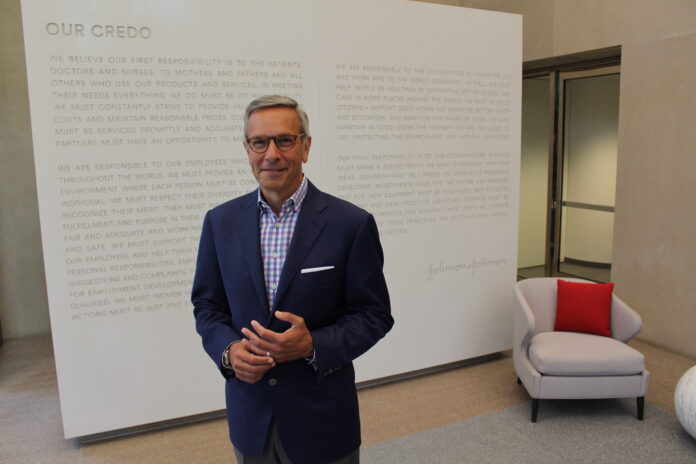Succession planning for a company’s top executive is no easy feat in a steady business climate—factor in a global health crisis and a sea of internal company changes, however, and it’s downright daunting. That’s the reality Johnson & Johnson CHRO Peter Fasolo, HRE’s 2022 HR Executive of the Year, had to manage as he prepared the global pharmaceutical giant for a new CEO last year, with the announcement that Alex Gorsky, who helmed the organization for 10 years, was leaving. His successor, Joaquin Duato took on the role at the start of 2022.
It was a job Fasolo had done before: He had been CHRO for about two years when, in 2012, then-CEO Bill Weldon decided to move on.
In both transitions, Fasolo says, he followed a “universal framework” that he says is “best in class”—and included a very strong partnership with the board of directors—and helped the company identify the right person for the job. That process, he says, needs to be tied in closely to where an organization is at a particular point in time.
Looking at the larger context in which a new CEO would be working was the first step in both CEO searches, Fasolo says.
“In both cases, it always started with, what’s the strategic direction of the company? Where is the company going?” he says. That includes a look at the global landscape—and the current events influencing that—the potential for new markets, the “innovation agenda” for the corporation. Ultimately, it’s about “grounding yourself in company strategy” to know the environment in which the new executive will be working.
For instance, in the most recent transition, leadership considered the company’s work to innovate in both healthcare and technology, the development of new modalities like gene therapy and cell therapy, and the growth of its med-tech business, including the development of surgical robotics. Importantly, the team also knew that the new CEO would be helming the planned separation of Johnson & Johnson’s consumer health business from its pharmaceutical and med-tech businesses.
 With that “strategic grounding,” Fasolo says, you can start building out a CEO profile. At Johnson & Johnson, the process was guided by the Credo—the company’s 80-year-old values statement that describes the principles on which the company was built, centered around a deep commitment to employees.
With that “strategic grounding,” Fasolo says, you can start building out a CEO profile. At Johnson & Johnson, the process was guided by the Credo—the company’s 80-year-old values statement that describes the principles on which the company was built, centered around a deep commitment to employees.
“You want a leader who is authentic, empathetic and understands that his or her primary responsibility is caring for the wellbeing of our employees so that they can deliver on the promise of the company,” he says.
His job then became about “creating choices” for the board, Fasolo says. In the latest CEO search, working with Gorsky, they identified a number of candidates and created interactions with the board: strategic presentations and formal and informal discussions. Duato had previously served as vice chair of the Executive Committee and had worked closely with company leaders, with responsibility that touched on the pharmaceutical business, the consumer business, J&J’s emerging technologies and more.
“He, for three-plus years, was schooled and grounded in the direction of the enterprise in conjunction with his partnership with Alex,” Fasolo says.
The board was “very comfortable” with his experience base and anchoring in company values—the fact that he had global experience, including as a dual citizen of the U.S. and Spain, also was important.
While the particulars of what Gorsky and Duato brought to the roles differed, as did the company’s strategic plan at the time, Fasolo’s responsibility as CHRO ultimately boiled down to trying to make the best prediction for success—given the understanding of the candidates and the company.
“You’re making a prediction on judgment for someone going into a role that they’ve never faced before,” he says. “You have to be very, very comfortable with the judgment you’re making—that it’s well-grounded in their learning, their ability to face situations they’ve not faced before. Can they draw upon the experiences they’ve had and their personal attributes—grounded in the right values—to make good decisions? Of course, I’m biased, but I think in both cases the board did a terrific job and made great choices for the company.”



